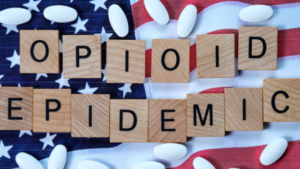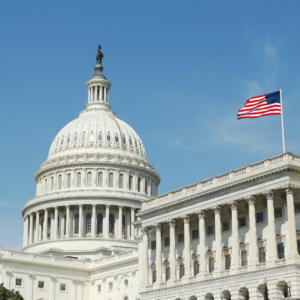by Gabriel Levitt, President, PharmacyChecker.com and Prescription Justice | Oct 5, 2018 | Drug Importation
As reported in Kaiser Health News, the personal drug importation cause had a little victory recently. A bill focused on the opioid crisis, H.R. 6, slated for final passage, includes language that is protective of individuals who import medicines for their own use, even illegally.
While its focus is curbing opioid abuse, H.R. 6 reforms drug importation laws that have nothing to do with opioids but empowers the FDA to stop imports of prescription drugs considered by the FDA to be misbranded (which can mean prescription drugs that have a Canadian not U.S. label). Those reforms will make it more difficult on people and business engaged in illegal, wholesale prescription drug importation. An earlier version of H.R. 6, from the House, included language that exempted imports for personal use. That language was quietly removed in a Senate version, which passed in that chamber. Then, apparently there was some protest among certain members of Congress and the language was put back in during conference – and is now in the final law.
Now I’m getting a lot of questions about the law and personal drug importation. There are several parts of law, regulation and policy very favorable to personal (but not wholesale) importation, which have yet to be compiled and addressed in one article. I endeavor to do that here. The gist is that Congress doesn’t want the FDA to unnecessarily stop Americans from buying medication from Canada and many other countries – even if it’s technically illegal. The position of Congress is clear in law if you look comprehensively and closely.
(more…)Tagged with: Congress, politics
by Gabriel Levitt, President, PharmacyChecker.com and Prescription Justice | Sep 28, 2018 | FDA enforcement
 This week, PharmacyChecker added information about Domperidone to our Domperidone drug price comparisons page to better educate people considering ordering this medicine. The product is also sold under the name “Domperidone Suspension” as well as the brand name “Motilium.” Exploring this drug and the U.S. Food & Drug Administration’s Expanded Access Program is key when looking at avenues of drug importation that are expressly permitted in the U.S. My aim in this post is to explain how this program works; differences of opinion about medical ethics related to Domperidone and other medications that may not be FDA-approved but are still of interest to doctors when treating their patients; and how this relates to the subject of personal drug importation overall.
This week, PharmacyChecker added information about Domperidone to our Domperidone drug price comparisons page to better educate people considering ordering this medicine. The product is also sold under the name “Domperidone Suspension” as well as the brand name “Motilium.” Exploring this drug and the U.S. Food & Drug Administration’s Expanded Access Program is key when looking at avenues of drug importation that are expressly permitted in the U.S. My aim in this post is to explain how this program works; differences of opinion about medical ethics related to Domperidone and other medications that may not be FDA-approved but are still of interest to doctors when treating their patients; and how this relates to the subject of personal drug importation overall.
Domperidone Treatment and Regulations in Different Countries
Domperidone is approved for sale in Canada and the United Kingdom, as well as other countries, but not the U.S. Unlike FDA-approved drugs sold in Canada and the UK, the FDA provides patients and their providers with a specific, permitted process to import Domperidone for personal use.
Domperidone is approved for sale in Canada for treating several gastrointestinal conditions; in the UK, it is only approved for the treatment of nausea and vomiting.
Domperidone increases lactation in breastfeeding mothers, but, due to serious potential side effects, it is not approved in any country for this purpose. However, in Australia and other countries, it is prescribed off-label to improve lactation. You can find an excellent discussion with points for and against this here: Off-label Prescribing of Domperidone
Expanded Access Programs
While the FDA has not approved it for sale in the U.S., Americans can access Domperidone under the federal agency’s Expanded Access Program. This program provides a permitted protocol to obtain drugs through an Investigational New Drug application (IND). Only FDA-approved drugs can be distributed in the U.S. INDs offer a path for drug companies who want to transport drugs that are not yet approved in the U.S. across state lines, usually for purposes relating to clinical trials of new drugs.
INDs are used by physicians to apply to the FDA to treat patients with Domperidone. While the FDA has not approved it for sale here, the FDA agrees that Domperidone may benefit people with severe gastrointestinal motility disorders when the potential benefits outweigh the risks.
Domperidone Risks
In 2004, with an import alert on Domperidone, the FDA very strongly came out against use of Domperidone for lactation and does not allow imports for that purpose. The agency also stopped compounding pharmacies from making and dispensing the drug domestically. The FDA states that the drug substantially increases the risk of cardiac problems, which outweigh the benefits (including aiding lactation). Interestingly, as recently as 2015, the Pharmacy Compounding Advisory Committee met with the FDA to try and change the agency’s mind to allow them to compound Domperidone. The request was denied.
Here’s a general overview of the program to obtain Domperidone. Detailed instructions for this process are contained in the FDA’s Domperidone IND Packet.
Domperidone Importation Exceptions
The FDA’s communications about this program are to physicians, patients and pharmacies – but patients cannot act without their providers. Unlike personal drug importation of FDA-approved drugs or foreign versions of FDA-approved drugs, to obtain drugs under the Expanded Access Program requires the participation of U.S. physicians, U.S. pharmacies, and the overseas manufacturers of the drugs.
The FDA has identified one pharmacy, called Dougherty’s Pharmacy, with two locations in Dallas, TX that is permitted to import and distribute Domperidone. It’s not clear why there is only one company involved. The FDA communicates that other pharmacies can apply to distribute Domperidone.
The FDA does not permit physicians and their patients to use the program to import Domperidone for breastfeeding mothers having problems with lactation. Recall, it’s also not approved for that purpose in Canada or the UK – or anywhere. However, in Australia, it’s prescribed off-label for this purpose. Off-label prescribing is when a provider writes a prescription for a patient to treat a condition with a drug that has not been approved by the FDA (in the U.S.) for that condition. Off-label prescribing is both legal and very common in the U.S., although controversial. According to WebMD, 20% of prescriptions are written off-label.
Physicians are allowed to prescribe medication off-label based on their medical judgement. I believe that would include Domperidone. One doctor, Juliet Mavromattes, MD, makes a case for why it would be medically unethical to prescribe Domperidone for lactation in the U.S. – but OK for GI disorders, per FDA’s guidance. Here’s a vehement defense of prescribing Domperidone to improve lactation from a pediatrician in Canada.
Safety When Buying Domperidone Online
If you do choose to buy Domperidone online from another country, be careful who you buy from. There are a lot of websites who will offer to sell this drug without a prescription. Many such sites are dangerous to order from. You can be more certain of obtaining the right medicine, dispensed by a licensed pharmacist, if you stick to ordering Domperidone from an online pharmacy verified through the PharmacyChecker Verification Program.
Prices for Domperidone 10mg range from 16 cents to 49 cents a pill: for 200 pills, that’s $32 vs. $98. The online pharmacies will likely decline to dispense it for lactation from certain countries, including Canada, but may do so from Australia where the drug is prescribed off-label.
FDA’s Path to Safe Personal Drug Importation
As this relates to personal drug importation overall, it’s interesting to note the reasoning the FDA provides for permitting it. Here are some highly relevant excerpts from the FDA’s website:
“The Expanded Access program facilitates availability of investigational drugs (such as Domperidone) to patients with serious diseases or conditions when there is no comparable or satisfactory alternative therapy to diagnose, monitor, or treat the patient’s disease or condition.
“To help facilitate the IND process, FDA has developed this packet, which includes instructions, templates, checklists, a protocol outlining the treatment plan (multi-patient INDs only), and summary of regulatory requirements. As sponsors of an active IND, physicians can prescribe Domperidone to qualifying patients.”
In view of the FDA’s positions here on availability and access, it provides a lot of room to defend lack of access based on affordability. It also shows how the FDA could engage healthcare providers in assisting patients with safe personal drug importation of FDA-approved drugs and foreign versions of FDA-approved drugs. For example, a doctor could fill out a form, similar to the one used to obtain Domperidone, to help a patient import a drug from Canada that the patient can’t afford domestically.
We know that doctors, nurse practitioners, and physician assistants—ones that recommend use of PharmacyChecker-verified online pharmacies—are concerned about the FDA’s actions against personal imports. They would appreciate a more organized pathway to help their patients obtain affordable drugs from Canada and overseas.
Tagged with: Domperidone, Expanded Access Program, imports
by Gabriel Levitt, President, PharmacyChecker.com and Prescription Justice | Sep 21, 2018 | Drug Importation
 This week, our nation’s great senators passed a bill, the Opioid Crisis Response Act (OCRA), to fight back against the opioid epidemic. You think we’re stuck in partisan gridlock? Well, think again: the bill passed 99-1. This is how it goes down when Pharma is cool with a bill. Big Pharma can unite Congress like no other industry, organization or, certainly, president can. This bill passed unanimously (almost), because senators don’t want to vote against a bill that is seemingly dedicated to tackling opioid addiction. But some provisions, ones that may curtail access to safe personal drug importation, are unrelated to opioids and you can smell Big Pharma working behind the scenes.
This week, our nation’s great senators passed a bill, the Opioid Crisis Response Act (OCRA), to fight back against the opioid epidemic. You think we’re stuck in partisan gridlock? Well, think again: the bill passed 99-1. This is how it goes down when Pharma is cool with a bill. Big Pharma can unite Congress like no other industry, organization or, certainly, president can. This bill passed unanimously (almost), because senators don’t want to vote against a bill that is seemingly dedicated to tackling opioid addiction. But some provisions, ones that may curtail access to safe personal drug importation, are unrelated to opioids and you can smell Big Pharma working behind the scenes.
There’s some easily digestible intrigue relating to this bill and personal importation, but the language itself is obscure and annoyingly technical as well.
Let’s start with the intrigue.
A bill numbered H.R. 6, passed the House in late June 2018. The bill was called: “Substance Use-Disorder Prevention that Promotes Opioid Recovery and Treatment for Patients and Communities Act or the SUPPORT for Patients and Communities Act.” [To find it via the link provided, click the bill text, and then use the dropdown to find the version of the bill on June 28th, 2018]. That earlier H.R. 6 included the following language:
“(c) DEFINITION. – For purposes of subparagraph (B), the term ‘pattern of importing or offering for import articles of drug’ means importing or offering for import articles of drug describes in subclause (I) or (ii) of subparagraph (B)(ii) in an amount, frequency, or dosage that is inconsistent with personal or household use by the importer.”
That language applies to both the bill itself and the existing statute, which further complicates things, but the gist is simple:
The author of that language wanted to make clear that this legislation should not affect small, personal or household quantity medication imports.
After the bill passed, 396-14, it went to the Senate, specifically the Senate Committee on Health, Education, Labor and Pensions (HELP), led by the chair, Senator Lamar Alexander (R-TN) and ranking member, Senator Pat Murray (D-WA). In HELP, I believe that Senator Alexander crossed out H.R. 6 and added a whole new bill in the form of a substitute amendment. That substitute amendment, without vote or a committee conference report, removed the language above that was protective of personal imports.
Go to the bill H.R. 6. [After clicking the link, you’ll see “AMENDMENT” – “Strike all after the enacting clause and insert the following.” That’s what I mean by replacing the entire bill with a new one; one that contains new language and omits other language.]
This backroom editing and revising of bills often undermine the democratic process but is sadly commonplace in Congress. Large industry trade associations know how to play the game to make sure those revisions and edits work in their favor. There is no better player than the Pharmaceutical Researchers and Manufacturers of America (PhRMA) and their allies.
But what the hell does that definition above mean and pertain to anyway?
It relates to something called debarment. Under federal law, specifically Section 301 (cc) of the Food, Drug and Cosmetics Act, Title 21 U.S. Code 331, a person who is debarred cannot be involved in certain work relating to FDA-regulated industries.
There is mandatory and permissive debarment. We’re just concerned with permissive debarment here. Current law mostly calls for debarment of individuals who have committed felonies and misdemeanors – crimes. HR 6 amends this language by adding to that list:
“[a] person [who] has engaged in a pattern of importing or offering for import…adulterated or misbranded drugs”
And by adding the bolded text as you see below to define a Prohibited Act:”
“The importing or offering for import into the United States of an article of food or a drug by, with the assistance of, or at the direction of, a person debarred under section 335a(b)(3) of this title”
Let’s say you buy your cholesterol and asthma medication from Canada on a regular basis.
That’s a pattern. Under federal law, because of the Canadian label, the medications are misbranded, even if they are the exact same drug as the one sold here. In theory, this patient and/or a person who has helped that patient can be debarred from doing so.
There you have it. Now you see why that original language was in there to protect such people who import medications that are consistent with personal or household use by the importer – not resale.
Synthetic Trafficking and Overdose Prevention Act (STOP)
Another part of this bill that threatens importation are the provisions taken from the Synthetic Trafficking and Overdose Prevention Act (STOP Act). The STOP Act’s stated goal is to stop illegal imports of fentanyl and other drugs. The STOP Act is focused on making changes to our system of regulating international mail shipments. Small import packages come through international mail facilities without tracking in the way that FedEx, UPS, DHL packages are required by law to be tracked. If you order a drug from a Canadian pharmacy, the U.S. Postal Service delivers it to you. When Chinese fentanyl ingredient traders want to get stuff into the U.S., it also goes through the USPS via international mail facilities. So, the STOP Act creates new rules for the USPS to know what’s coming in with the goal of stopping illegal drugs.
The STOP Act can be great because it will be harder for opioid dealers in the U.S. to import the ingredients or finished opioid drugs that wreak havoc on our people. It’s potentially bad because the FDA very well might use this to stop “other drugs,” such as personal imports of lower-cost medicines, because it will be easier to do with the advanced data about incoming mail packages required under the new regulations. It’s certainly concerning because the drug companies and their allies have invested time and money to highlight, as a negative, that Americans receive their lower-cost medications via USPS.
Creating and Restoring Equal Access To Equivalent Samples Act (CREATES) vs. Higher Medicare Drug Prices
Now that different versions of the bill H.R. 6 have passed the House and Senate, the two chambers meet in conferences to create one version for the president to sign. To add insult to injury, behind the scenes, Pharma is trying to add language that would erase new discounts in Medicare Part D slated for 2019. On the other hand, drug price advocates are trying to get language in there to push through the provisions of the CREATES Act (Creating and Restoring Equal Access To Equivalent Samples Act).
Simply put, now, brand drug companies sometimes make it hard for generic drug companies to acquire the pharmaceutical samples they need to create a lower-cost generic. If CREATES goes through, generic drug companies could more easily obtain these samples. That would facilitate faster generic availability and save patients and taxpayers money: about $3-4 billion. The just outcome is Pharma losing its pitch to ditch the Medicare savings and then CREATES makes it in the bill! I’ve heard talk about horse trade.
What does this bill do to curtail the opioid epidemic? It will help, but it’s not even close to what is needed. I’m not going there at the moment, but here’s Politico’s take. Since there’s some good stuff in there, Congress feels obligated to go for it; so here we are. As I’ve shown you, Pharma’s many allies in Congress have used this bill to sneak in stuff that is unrelated to opioid addiction that Pharma wants – including taking a jab at importation and lower drug prices in other countries.
Tagged with: Opioid Crisis Reduction Act, opioids, politics, Synthetics Trafficking and Opioid Prevention Act





